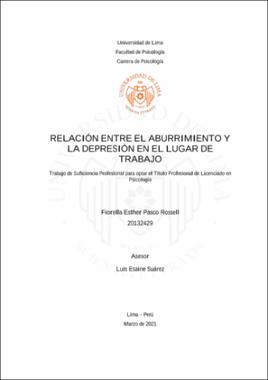Relación entre el aburrimiento y la depresión en el lugar de trabajo

View/
Trabajo
(application/pdf: 1.006Mb)
(application/pdf: 1.006Mb)
Date
2021Author(s)
Advisor(s)
Metadata
Show full item recordAbstract
The relationship between job demands and mental health of workers is a topic of interest
for researchers in the area of occupational psychology (Rosario-Hernández et al., 2020).
Boredom at work is a common feeling; it is estimated that a quarter to 87% of the
employees feel bored at least some times at work (van Hooff & van Hooft, 2014).
However, when it lasts for a long time, it can lead to depression. The aim of this work is
to identify the relationship between boredom and depression in the workplace, for which
an applicated research of previous related studies to this topic was done. The PRISMA
guidelines (Urrutia and Bonfill, 2013) were followed and the databases consulted were
Scopus, EBSCO, Proquest and Researchgate, selecting eight articles to analyze boredom
and depression at the workplace. Results show that there is a positive relationship
between both variables, meaning greater boredom, greater depression. It was also found
that there are variables that help to mitigate the appearance of depression and that
boredom is also linked to anxiety and stress. Future research should homogenize the
measurement of both variables in order to achieve greater cientific rigor. La relación existente entre las exigencias de un trabajo y la salud mental de los
trabajadores ha sido un tema de interés para investigadores del área de psicología
ocupacional (Rosario-Hernández et al., 2020). El sentirse aburrido en el lugar de trabajo
es un sentimiento común, estimándose que desde una cuarta parte hasta el 87% de los
trabajadores suelen sentir aburrimiento algunas veces (van Hooff y van Hooft, 2014). Sin
embargo, cuando se da de manera prolongada, puede llegar a desencadenarse en una
depresión. El objetivo de este trabajo es identificar la relación entre el aburrimiento y la
depresión en el lugar de trabajo, para lo cual se realizó una búsqueda aplicada de
investigaciones previas relacionadas a dicho tema. Se siguieron los lineamientos
PRISMA (Urrutia y Bonfill, 2013) y la bases de datos consultadas fueron Scopus,
EBSCO, Proquest y Researchgate, seleccionando ocho artículos para analizar el
aburrimiento laboral y la depresión. Los resultados mostraron que existe una relación
positiva entre ambas variables, por lo que a mayor aburrimiento, mayor depresión. Se
encontró también que existen variables que ayudan a mitigar la aparición de la depresión
y que el aburrimiento está también ligado a la ansiedad y estrés. Investigaciones futuras
deben homogeneizar la medición de ambas variables con el fin de llegar a un mayor rigor
científico.
How to cite
Pasco Rossell, F. E. (2021). Relación entre el aburrimiento y la depresión en el lugar de trabajo [Trabajo de Suficiencia Profesional para optar el Título Profesional de Licenciado en Psicología, Universidad de Lima]. Repositorio Institucional de la Universidad de Lima. https://hdl.handle.net/20.500.12724/13208Publisher
Universidad de LimaCollections
The following license files are associated with this item:

